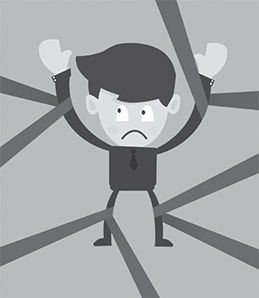The reason for red tape
 CREDIT: BOBAA22/THINKSTOCK
CREDIT: BOBAA22/THINKSTOCKRed tape is a bother for all, but is there a reason for it?
The word “political” is often used to describe situations in which a decision is made for the benefit of a select few. Small wonder then that when it comes to actual politics, decisions are rarely made in the interest of the greater good.
Deregulation has been a defining element of Prime Minister Stephen Harper’s Conservative Party, and, although the long-term effects have yet to be seen, the short term ones are worrisome enough.
Red tape is often in place to keep the balance as it is. Too many broad changes in legislation in a short period of time can lead to a destabilization in the government as agencies lack the ability to adapt to cutbacks across the board. The underlying framework of legislation in Canada is like the hull of a ship beneath the water: though not visible, it’s the stabilizing force that keeps the ship upright.
The deregulation of various industries across Canada is already having a cascading effect on our international trade.
Following the 2008 listeria outbreak, the Conservative government promised major improvements to meat inspection and safety standards. Four years later, it was found that one of the largest beef manufacturing facilities in Canada, XL Foods Inc., was found to be exporting e-coli contaminated beef. Earlier that year, the Conservative government announced the laying-off of almost 20,000 federal employees, including hundreds from the Canadian Food Inspection Agency.
Unsurprisingly, the outbreak led to promises of hiring more inspectors and throwing a big number with a lot of zeroes at the problem but considering the effectiveness of that solution to date, a healthy level of scepticism might be in order.
Without addressing any of the considerable fallout in international trade due to the XL Foods incident, the Canadian Border Services Agency has been publicly bemoaning cutbacks since 2012. The federal government commissioned a report that was made public in 2012, which found enormous quantities of chemicals to manufacture illegal drugs as well as counterfeit goods making their way into the country. The head of the union for the CBSA at the time, Jean-Pierre Fortin, reported that less than one per cent of the cargo passing through the Port of Montréal was being inspected.
Throughout his campaign of deregulation, Harper has simply embodied the conservative ideal of having a small government. The idea that the government should be working for the people instead of employing them has been reflected in almost every conservative administration to date and his is no exception.
The key difference when it comes to Harper is that, through enthusiastic use of omnibus bills, he’s been able to significantly alter the fabric of Canada during his terms in office. From eliminating non-digitized information at federal libraries to preventing federal scientists from responding to media requests, Harper is pushing the boundaries of what could be considered democratic.
Regardless of individual bias, there are objective measures of the state of a democracy and muzzling scientists while closing libraries should be throwing up a huge red flag for any concerned Canadian.
Editorial opinions or comments expressed in this online edition of Interrobang newspaper reflect the views of the writer and are not those of the Interrobang or the Fanshawe Student Union. The Interrobang is published weekly by the Fanshawe Student Union at 1001 Fanshawe College Blvd., P.O. Box 7005, London, Ontario, N5Y 5R6 and distributed through the Fanshawe College community. Letters to the editor are welcome. All letters are subject to editing and should be emailed. All letters must be accompanied by contact information. Letters can also be submitted online by clicking here.













